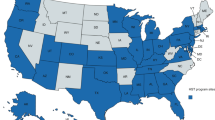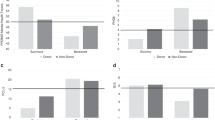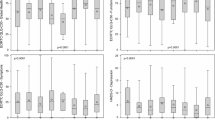Abstract
There are many studies that examine the psychosocial adjustment of survivors of bone marrow transplantation (BMT). On the other hand, there are relatively few studies that examine the psychosocial adjustment of patients prior to BMT, and even fewer that focus on the psychosocial adjustment of the patient's caregiver. The purpose of the present study was to assess performance status and psychosocial adjustment to illness, mood and stress response of patients and caregivers prior to admission for allogeneic BMT. Forty patients and their 39 caregivers were assessed using standardized measures. One-fourth of the patients reported clinical levels of psychosocial maladjustment on the Psychosocial Adjustment to Illness Scale and had greater adjustment problems than BMT survivors. Approximately one-third (35%) and one-quarter (23%) of the patients reported significant symptoms of intrusive and avoidance stress responses, respectively on the Impact of Events Scale. Caregivers reported more impairments in family relationships than patients, but overall reported similar distress to that of patients. Information about the pre-BMT process appears to be critical to understanding the psychosocial impact that BMT can have on patients and their caregivers. Bone Marrow Transplantation (2001) 27, 1181–1188.
This is a preview of subscription content, access via your institution
Access options
Subscribe to this journal
Receive 12 print issues and online access
$259.00 per year
only $21.58 per issue
Buy this article
- Purchase on Springer Link
- Instant access to full article PDF
Prices may be subject to local taxes which are calculated during checkout
Similar content being viewed by others
References
Rizzo JD . New summary slides show current trend in BMT Intl Bone Marrow Transplant Reg News 1998 5: 1–12
Rodrigue JR, Boggs SR, Weiner RS, Behen JM . Mood, coping style, and personality functioning among adult bone marrow transplant candidates Psychosomatics 1993 34: 159–165
Horowtiz M . New IBMTR/ABMTR slides summarize current use and outcome of allogeneic and autologous transplants Intl Bone Marrow Transplant Reg News 1995 2: 1–12
Baker F, Marcellus D, Zabora J et al. Psychological distress among adult patients being evaluated for bone marrow transplantation Psychosomatics 1997 38: 10–19
Keogh F, O'Riordan J, McNamara C et al. Psychosocial adaptation of patients and families following bone marrow transplantation: a prospective, longitudinal study Bone Marrow Transplant 1998 22: 905–911
Colon EA, Callies AL, Popkin MK et al. Depressed mood and other variables related to bone marrow transplantation survival in acute leukemia Psychosomatics 1991 32: 420–425
Zabora J, Smith E, Baker F et al . The family: the other side of bone marrow transplantation J Psychosoc Oncol 1992 10: 35–46
Baider L, Kaplan De-Nour A . Couples’ reaction and adjustment to mastectomy Intl J Med Psychiat 1984 14: 265–276
Baider L, Kaplan De-Nour A . Adjustment to cancer: who is the patient – the husband or the wife? Israel J Med Sci 1988 24: 631–636
Cassileth BR, Lusk EJ, Strouse TB et al. Psychological analysis of cancer patients and their next of kin Cancer 1985 55: 72–76
Keitel MA, Zevon MA, Rounds JB et al. Spouse adjustment to cancer surgery: distress and coping responses J Surg Oncol 1990 43: 148–153
Northouse LL, Mood D, Templin T et al. Couples’ patterns of adjustment to colon cancer Soc Sci Med 2000 50: 271–284
Baider L, Koch U, Esacson R, Kaplan De-Nour A . Prospective study of cancer patients and their spouses: the weakness of marital strength Psycho-Oncol 1998 7: 49–56
Baider L, Perry S, Holland J et al. Couples and gender relationship: a sample of melanoma patients and their spouses Family Systems Med 1995 13: 1–9
Kornblith AB, Anderson J, Cella DF et al. Comparison of psychosocial adaptation and sexual function of survivors of advanced Hodgkin's disease treated by MOPP, ABVD, or MOPP alternating with ABVD Cancer 1992 70: 2508–2516
Aneshensel CS, Frerichs RR, Clark VA, Yokopenic PA . Telephone versus in-person surveys of community health status Am J Publ Health 1985 72: 1017–1021
Paulsen A, Crowe RR, Noyes R, Pfohl B . Reliability of the telephone and household interviewing in diagnosing anxiety disorders J Am Stat Assoc 1988 71: 269–274
Schag CC, Heinrich RL, Ganz PA . Karnofsky performance status revisited: reliability, validity, and guidelines J Clin Oncol 1984 3: 187–193
Karnofsky DA, Burchenal JH . The clinical evaluation of chemotherapeutics in cancer. In: MacLoed CM (ed.) Evaluation of Chemotherapeutic Agents Columbia Press: New York 1949 pp 191–205
Derogatis LR, Derogatis MF . The Psychosocial Adjustment to Illness Scale (PAIS and PAIS-SR) Administration, Scoring and Procedures Manual-II Clinical Psychometric Research: Townson, Maryland 1990
Baider L, Perez T, Kaplan De-Nour A . Gender and adjustment to chronic disease a study of couples with colon cancer Gen Hosp Psychiat 1989 11: 1–8
McNair DM, Lorr M, Droppleman LF . Manual for the Profile of Mood States Educational and Industrial Press: San Diego 1971
Horowitz M, Wilner N, Alvarez W . Impact of event scale: a measure of subjective stress Psychosom Med 1979 41: 209–218
Cella DF, Mahon SM, Donovan MI . Cancer recurrence as a traumatic event Behavior Med 1990 16: 15–22
Wenzel LB, Fairclough DL, Brady MJ et al. Age-related differences in the quality of life of breast carcinoma patients after treatment Cancer 1999 86: 1768–1774
Hays WL . Statistics Harcourt Brace College Publishers: Fort Worth 1994
Molassiotis A, van den Akker OBA, Milligan DW et al. Quality of life in long-term survivors of marrow transplantation: comparison with a matched group receiving maintenance chemotherapy Bone Marrow Transplant 1996 17: 249–258
Siston AK . Patient and caregiver adaptation to allogeneic bone marrow transplantation (unpublished dissertation data)
Horowitz MJ . Stress response syndromes and their treatment. In: Goldberger L, Breznitz S (eds) Handbook of Stress: Theoretical and Clinical Aspects Free Press: New York 1982 pp 711–732
Horowitz MJ, Field NP, Classen CC . Stress response syndromes and their treatment. In: Goldberger L, Breznitz S (eds) Handbook of Stress: Theoretical and Clinical Aspects Free Press: New York 1993 pp 757–773
Woolley N . Crisis theory: a paradigm of effective intervention with families of critically ill people J Adv Nurs 1990 15: 1402–1408
Cordova MJ, Andrykowski MA, Kenady DE et al. Frequency and correlates of posttraumatic-stress disorder-like symptoms after treatment for breast cancer J Consult Clin Psychol 1995 63: 981–986
Andrykowski MA, Brady MJ, Henslee-Downey PJ . Psychosocial factors predictive of survival after allogeneic bone marrow transplantation for leukemia Psychosom Med 1994 56: 432–439
Fisch M, Unverzagt F, Hanna M et al. Information preferences, reading ability, and emotional changes in outpatients during the process of obtaining informed consent for autologous bone-marrow transplantation J Cancer Ed 1998 13: 71–75
Sales E, Schuylz R, Biegel D . Predictors of strain in families of cancer patients: a review of the literature J Psych Oncol 1992 10: 1–26
Goldstein V, Regnery G, Wellin E . Caretaker role fatigue Nurs Outlook 1981 29: 24–30
Futterman AD, Wellisch DK, Bond G, Carr CR . The psychosocial level system: a new rating scale to identify and assess emotional difficulties during the bone marrow transplantation Psychosomatics 1991 32: 177–186
Acknowledgements
This study was conducted at the University of Chicago and supported in part by the University of Chicago Home Health Care Grant. We would like to thank Dana Hagerman and Mitchell Robertson for their assistance with this project. We would also like to thank Sara Knight, PhD for her comments. Special thanks to the patients and their family members from the University of Chicago and Indiana University for participating in this research.
Author information
Authors and Affiliations
Rights and permissions
About this article
Cite this article
Siston, A., List, M., Daugherty, C. et al. Psychosocial adjustment of patients and caregivers prior to allogeneic bone marrow transplantation. Bone Marrow Transplant 27, 1181–1188 (2001). https://doi.org/10.1038/sj.bmt.1703059
Received:
Accepted:
Published:
Issue Date:
DOI: https://doi.org/10.1038/sj.bmt.1703059
Keywords
This article is cited by
-
Quality of life and mood of older patients with acute myeloid leukemia (AML) receiving intensive and non-intensive chemotherapy
Leukemia (2019)
-
The Effect of Psychosocial Interventions on Outcomes for Caregivers of Hematopoietic Cell Transplant Patients
Current Hematologic Malignancy Reports (2018)
-
Factors associated with post-traumatic stress symptoms experienced in the acute phase following haemopoietic stem cell transplant
Bone Marrow Transplantation (2016)
-
Prognostic understanding, quality of life and mood in patients undergoing hematopoietic stem cell transplantation
Bone Marrow Transplantation (2015)
-
Caregivers’ quality of life after blood and marrow transplantation: a qualitative study
Bone Marrow Transplantation (2014)



